|
|
|
Sort Order |
|
|
|
Items / Page
|
|
|
|
|
|
|
| Srl | Item |
| 1 |
ID:
075400
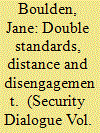

|
|
|
|
|
| Publication |
2006.
|
| Summary/Abstract |
The article examines three specific aspects of military operations authorized by the UN Security Council in the post-Cold War period. The trends examined respond to the following questions: Who chooses what gets on the Security Council's agenda? Who implements actions authorized by the Security Council? And what is it that they are doing? The answers reveal that it is the P-5 who control both what gets on the Security Council agenda and, importantly, what does not. In terms of carrying out Security Council activity, the post-Cold War period has generated a division of labour whereby developing states are the main providers of troops for blue-helmeted UN operations, while developed states contribute to coalition operations in their own regions and/or when their own vital interests are at stake. The main activity is post-conflict or what might be termed pre-post-conflict operations. Taken together, these trends characterize a Council that can be described as distant and disengaged, at least for some conflicts in some parts of the world. Using Claude's idea of collective legitimization, the article argues that these trends suggest that greater consideration needs to be given to how to recoup Council legitimacy, not just how to increase its representative nature, when debating UN reform. While both representativeness and legitimacy are desirable, the pursuit of one without considering the repercussions to the other may ultimately undermine the objectives of reform.
|
|
|
|
|
|
|
|
|
|
|
|
|
|
|
|
| 2 |
ID:
097085


|
|
|
| 3 |
ID:
005353
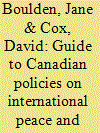

|
|
|
|
|
| Publication |
Ontario, Canadian Centre for Global Security, 1994.
|
| Description |
xv, 200p.
|
| Standard Number |
0920357555
|
|
|
|
|
|
|
|
|
|
|
|
Copies: C:1/I:0,R:0,Q:0
Circulation
| Accession# | Call# | Current Location | Status | Policy | Location |
| 036593 | 327.170971/BOU 036593 | Main | Withdrawn | General | |
|
|
|
|
| 4 |
ID:
061936
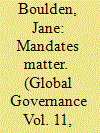

|
|
|
|
|
| Publication |
Apr-Jun 2005.
|
|
|
|
|
|
|
|
|
|
|
|
|
|
|
|
| 5 |
ID:
003122
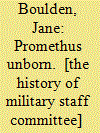

|
|
|
|
|
| Publication |
Ottawa, Canadian Centre for Global Security, 1993.
|
| Description |
vi, 43p.
|
| Series |
Aurora Paper; no.19
|
| Standard Number |
0920357393
|
|
|
|
|
|
|
|
|
|
|
|
Copies: C:1/I:0,R:0,Q:0
Circulation
| Accession# | Call# | Current Location | Status | Policy | Location |
| 034761 | 341.232/BOU 034761 | Main | On Shelf | General | |
|
|
|
|
| 6 |
ID:
053731
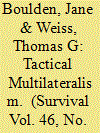

|
|
|
|
|
| Publication |
2004.
|
| Description |
p103-114
|
| Summary/Abstract |
The United Nations' and United States' responses to the events of 11 September and to Iraq reveal lessons and dilemmas for both. After a decade of having its legitimacy tested and undermined, the organisation is at a crossroads. The possible directions it can take are deeply influenced by US actions. For Washington, its use of the UN in the immediate aftermath of 11 September and its return to the organisation for help with post-war Iraq reveal an approach that continues a tradition of mixed messages at the UN. It is essential to facilitate this tactical multilateralism – a recognition of the importance of UN legitimacy and support to US interests – even though that recognition may constrain US actions and choices.
|
|
|
|
|
|
|
|
|
|
|
|
|
|
|
|
| 7 |
ID:
086353
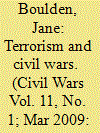

|
|
|
|
|
| Publication |
2009.
|
| Summary/Abstract |
This article reviews the civil war and terrorism literature and then explores the international communities' responses to both. Both the academic literature and the international community tend to approach terrorism and civil war along separate tracks. A key question is whether or not this approach needs to be re-evaluated given the blurring of the distinction between what goes on inside and outside the state when it comes to political violence. If the goal of analysts and the international community is to maintain order, then treating civil wars and terrorism separately may be appropriate. If, however, the goal is to devise more effective means to deal with political violence generally, then the causes of civil war and terrorism must be investigated more closely and the two phenomena must be approached together rather than separately.
|
|
|
|
|
|
|
|
|
|
|
|
|
|
|
|
| 8 |
ID:
058145


|
|
|
|
|
| Publication |
Bloomington, Indiana University Press, 2004.
|
| Description |
xvi, 256p.
|
| Standard Number |
0253216621
|
|
|
|
|
|
|
|
|
|
|
|
Copies: C:1/I:0,R:0,Q:0
Circulation
| Accession# | Call# | Current Location | Status | Policy | Location |
| 049020 | 345.02/BOU 049020 | Main | On Shelf | General | |
|
|
|
|
|
|
|
|
|